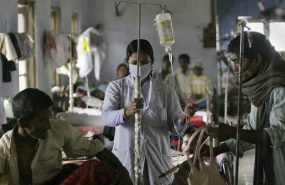Global Fund Technical Brief: Harm reduction for people who use drugs
- 28.07.2020 11:44
- Post Views: 797
According to Global Fund policy, lower-middle and upper-middle income countries applying for funding must focus 100% of budget on key populations and 50% of budget on underserved populations, as well as on the highest-impact interventions. Low-income countries are also strongly encouraged to target resources to those at highest risk.
It is therefore strongly recommended that all countries with evidence of HIV transmission among people who use drugs include in their proposals harm reduction programs for people who use drugs, both in the general community and in prison and other closed settings.
The harm reduction interventions outlined in this brief include those recommended in the World Health Organization’s (WHO) Consolidated Guidelines on HIV Prevention, Diagnosis, Treatment and Care for Key Populations (2016). Those guidelines expanded upon the ones issued by WHO, the Joint United Nations Programme on HIV/AIDS (UNAIDS) and the United Nations Office on Drugs and Crime (UNODC) in the WHO, UNAIDS, UNODC Technical Guide for Countries to Set Targets for Universal Access to HIV Prevention, Treatment and Care for Injecting Drug Users – 2012 Revision.
This technical brief is also aligned with the programmatic guidance in Implementing Comprehensive HIV and HCV Programmes with People Who Inject Drugs: Practical Guidance for Collaborative Interventions (the “IDUIT”, 2017), which combines the experience and expertise of United Nations agencies, other international partners, and organizations and networks of people who use drugs.
Global Fund Technical Brief: Harm reduction for people who use drugs
Related News
Global Fund Strategy Development – Open Consultation Questions
COVID-19 is radically altering global health, politics and economics, and the impact upon programs fighting HIV, TB and malaria will likely be tremendous. The new pandemic could completely derail our vast efforts of the past 20 years. At the same time, it has galvanized public awareness on global health security in a way that builds […] Read moreGlobal Fund Technical Brief Tuberculosis, Gender and Human Rights
The purpose of this technical brief is: to assist Global Fund applicants to consider how to include programs to remove human rights and gender-related barriers to tuberculosis prevention, diagnosis and treatment services within funding requests, and to help all stakeholders ensure that TB programs promote and protect human rights and gender equality. Post Views: 812 Read moreGlobal Fund Technical brief on HIV and key populations Programming at scale with sex workers, men who have sex with men, transgender people, people who inject drugs, and people in prison and other closed settings
The purpose of this technical brief is to provide information for countries preparing funding requests for comprehensive programs that address the cascade of HIV prevention, diagnosis, treatment, and care for the following key populations: male, female, and transgender sex workers, gay men and other men who have sex with men, transgender people (especially transgender women), […] Read moreServices for migrants and refugees from Ukraine – HIV/TB care with a focus on key populations
Due to the increasing flows of refugees from Ukraine because of Russia’s invasion of Ukraine, the EECA Regional Platform created a spreadsheet to fill contacts details of face-to-face and online services for refugees and migrants (with a focus on HIV/TB care and key population groups).
Regional Platform – EECA
This web-resource is a part of new regional communication and coordination project “Regional Civil Society and Community Support, Coordination and Communication Platform - EECA”, implemented by Eurasian Harm Reduction Association (EHRA).
Tags
See also
-
Grant Cycle 7 Reprioritization: How can communities prepare? 02.07.2025 12:03
-
Webinar: Using Global Fund's Data for Advocacy 12.06.2025 12:00







